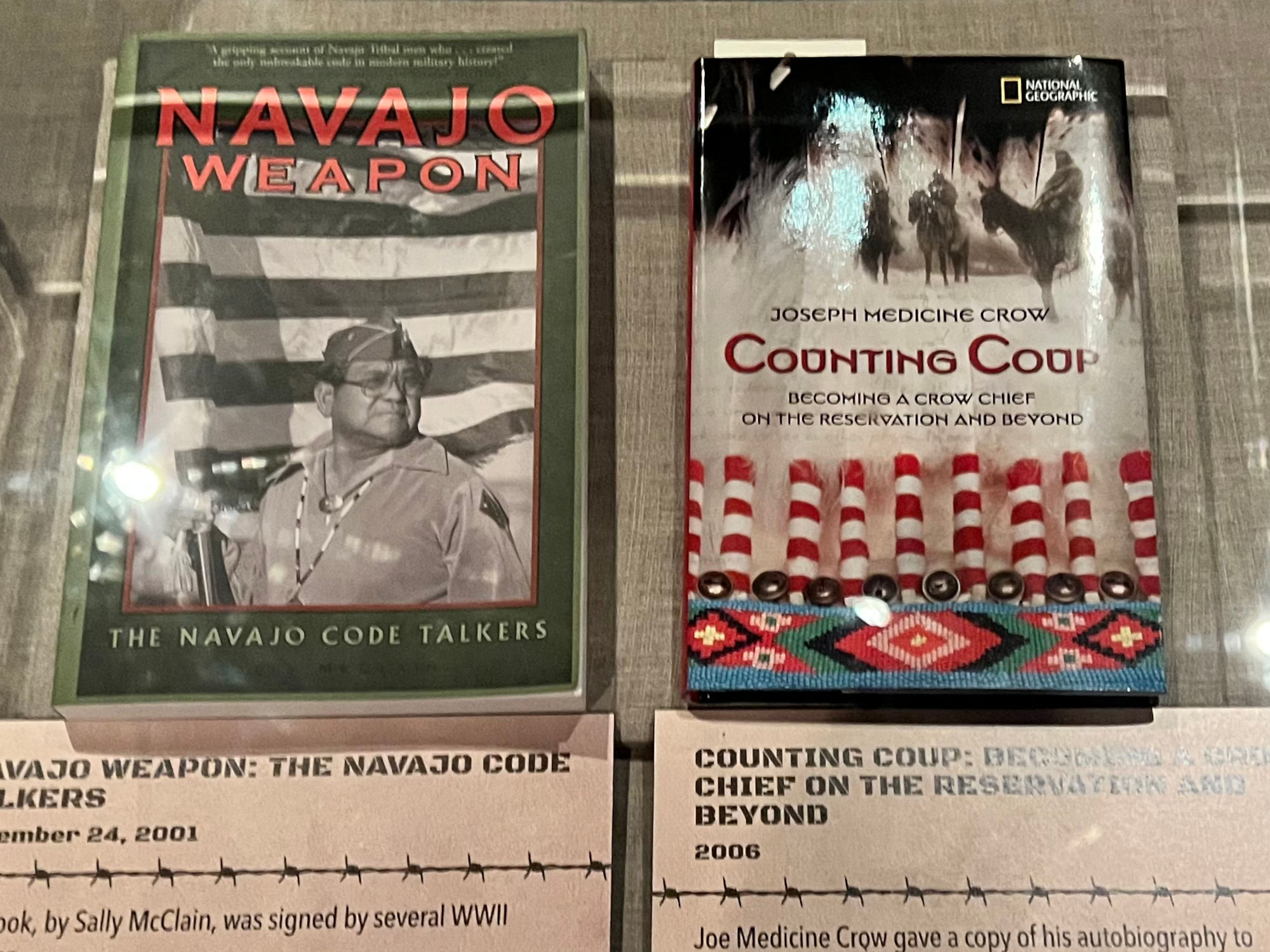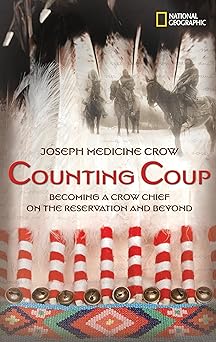While in Nazi-occupied Europe, Medicine Crow performed the four acts that would make him a Crow War Chief:
- Lead a raiding party
- Touch a live enemy in battle
- Capture an enemy's weapon
- Steal an enemy's horse

The Last Crow War Chief
Joe Medicine Crow was born October 27, 1913 on the Crow Indian reservation in Montana. He was a descendant of White Man Runs Him, a scout for George Custer before the Battle of the Little BigHorn, and Medicine Crow, a tribal chief. He was taught the Crow methods of hunting, tracking, and combat. He attended college at Bacone College and received a master's degree in anthropology from USC in 1939, the first member of the Crow tribe to earn a master's degree. He was working on a doctorate degree when WWII broke out. Medicine Crow enlisted in the Army in 1943, he became a scout in the 103rd Infantry Division and was sent to Europe. Whenever Medicine Crow was in combat, he painted red stripes on his arms beneath his uniform and carried a sacred yellow-painted eagle feather in his helmet.
While in Nazi-occupied Europe, Medicine Crow performed the four acts that would make him a Crow War Chief. The traditional requirements were to lead a raiding party, touch a live enemy in battle (counting coup), capture an enemy's weapon, and steal an enemy's horse. In his duties as a scout, he performed the first three. Medicine Crow's commanding officer ordered him to lead seven men on a raid to blast a hole in the Siegfried Line with a load of TNT. Then, when Medicine Crow was on a mission in a German-held village, he literally ran into a German soldier. They got into a fistfight, with Medicine Crow choking the soldier until he cried out "mama!" He let the German live, but took his prisoner's rifle. All that was left was to take a horse.
While scouting, Medicine Crow and his men found a small farm that German officers had commandeered - a farm with a large herd of horses. In the early morning, Medicine Crow snuck past the guards and tied a rope into a Crow bridle. He mounted one of the horses, and, riding bareback, he stampeded the rest, stealing over fifty horses while singing Crow war songs.
 After the war, he returned to Crow Nation, lectured on Little Bighorn, and served as the Crow Tribal historian.
Medicine Crow was awarded the Bronze Star and the French Legion of Honor Chevalier medal.
In 2009, he was presented with the Presidential Medal of Freedom.
Medicine Crow died on April 3, 2016 at the age of 102.
After the war, he returned to Crow Nation, lectured on Little Bighorn, and served as the Crow Tribal historian.
Medicine Crow was awarded the Bronze Star and the French Legion of Honor Chevalier medal.
In 2009, he was presented with the Presidential Medal of Freedom.
Medicine Crow died on April 3, 2016 at the age of 102.
National Park ServiceA Rich Legacy
Born October 27, 1913 near Lodge Grass, Montana, Dr. Joseph Medicine Crow is the last living person with a direct oral history from a participant of the Battle of Little Bighorn in 1876. His grandfather, White Man Runs Him was a scout with General Custer and died in 1925 when Medicine Crow was 11 years old.Dr. Medicine Crow's grandparents lived before the United States Government sent Indians to a reservation in 1884. His father was a boyhood friend of Chief Plenty Coups and had advised Plenty Coups to go to the nation's capital to present the Indians cases for preserving their ancestral land. Medicine Crow was the first one of his tribe to earn a Master's Degree. He attended the University of Southern California and earned his degree in 1939.
Military Exploits
According to tribal tradition, in order to become a Chief of the Tribe, certain Crow Military requirements have to be met, consisting of four deeds.
- Touch or strike the first enemy fallen, whether alive or dead
- To wrestle a weapon away from an enemy warrior
- To enter an enemy camp at night and steal a horse
- To command a war party successfully
One of the requirements he accomplished also complied with the U.S. government policy.
During World War 2 he served in Europe. One of his most notable exploits occurred in a planned raid. His unit hit a little town with just one main street. He did not want to participate in such a raid but instead asked his superior's permission to have a little extra time to accomplish a deed.
The Commanding Officer (C.O.) sent him around the street and down an alley. He saw an opening in a gate and a German was doing the same thing. They bumped heads and Joe gave him a butt stroke with his rifle and knocked the enemy's rifle out of his hand.
Another time, Joe's company had breached the German line and pushed them into the hills. The Germans came back, surrounding Joe's company which had run out of ammunition. The C.O. said if anybody could get through it would be Joe. He was ordered to lead a group of soldiers on a mission through the lines to procure much needed ammunition.
Joe was 34 years old; the old man of his company. Medicine Crow led his squad through land mines, avoiding enemy fire to reach the U.S lines. There they had a quick meal and managed to return to their company with ammunition.
Medicine Crow was scouting ahead of his company when he saw some Germans riding horses along a road. It was near dark so he followed them to a ranch with a shed, unsaddled and then went inside. The idea was to attack early in the morning while the enemy was still sleeping.
A Big War Whoop
He asked the Captain to give him five minutes before daylight and he would take care of those horses. The time came and he took a fellow soldier to give him a hand. They went to the shed and crawled in. He got on a horse with a little rope, fashioning a double half hitch for an Indian bridle. Then he started the horses out, gave a big war whoop and took off. They chased those horses over the hill and out of site. He did not want to be a part of the raid, as he might stop a bullet, so over the hill he went with a bunch of horses leaving the enemy without transportation.
WIKIPEDIAJoe Medicine Crow
October 27, 1913 – April 3, 2016
A Native American writer, historian and war chief of the Crow Nation. His writings on Native American history and reservation culture are considered seminal works, but he is best known for his writings and lectures concerning the Battle of the Little Bighorn of 1876.Medicine Crow was a World War II veteran, serving as a scout in the 103rd Infantry Division of the US Army. He received the Bronze Star Medal and the Legion d'honneur for his service during World War II. In 2009, he was awarded the Presidential Medal of Freedom by Barack Obama.
Medicine Crow was a founding member of the Traditional Circle of Indian Elders and Youth. He was the last war chief of the Crow Nation and the last Plains Indian war chief.
World War II
After spending the latter half of 1942 working in the naval ship yards in Bremerton, Washington, Medicine Crow joined the U.S. Army in 1943. He became a scout in the 103rd Infantry Division, and fought in World War II. Whenever he went into battle, he wore his war paint (two red stripes on his arms) beneath his uniform and a sacred yellow painted eagle feather, provided by a "sundance" medicine man, beneath his helmet.Medicine Crow completed all four tasks required to become a war chief: touching an enemy without killing him (counting coup), taking an enemy's weapon, leading a successful war party, and stealing an enemy's horse. He touched a living enemy soldier and disarmed him after turning a corner and finding himself face to face with a young German soldier:
The collision knocked the German's weapon to the ground. Mr. Crow lowered his own weapon and the two fought hand-to-hand. In the end Mr. Crow got the best of the German, grabbing him by the neck and choking him. He was going to kill the German soldier on the spot when the man screamed out 'mama.' Mr. Crow then let him go.
He also led a successful war party and stole fifty horses owned by the Waffen SS from a German camp, singing a traditional Crow honor song as he rode off.
Medicine Crow is the last member of the Crow tribe to become a war chief.

- Navajo Weapon
The Navajo Code Talkers
November 24, 2001
This book, by Sally McClain, was signed by several WWII veterans - Counting Coup
Becoming a Crow Chief on the Reservation and Beyond
2006
Joe Medicine Crow gave a copy of his autobiography to President Obama when he was awarded the Presidential Medal of Freedom on August 12, 2009.











